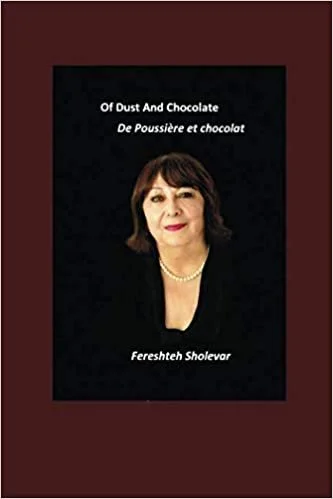Of Dust and Chocolate / De Poussière et chocolat
Parnilis Media
$6.39
You can purchase a copy here.
Reviewed by Autumn Konopka
Fereshteh Sholevar’s Of Dust and Chocolate / De Poussière et chocolat is a collection of dual-language poems, presented side-by-side in French and English. Full of strong images and striking metaphors, these poems offer meditations on aging, loss, and relationships, as they honor the minute particulars of ordinary life that are often overlooked or unappreciated.
While Sholevar’s verse exists in a world of conflict, devastation and sadness, it is not a world without light. In fact, one of the greatest strengths of this collection is the poet’s ability to balance joy and darkness. Take for instance “Pandora’s Box”:
…Let grief be grief.
There is no closure when lives are lost.
How can you close the door
when there’s none in the frame? …
…Let me also say that there is goodness and grandeur.
There is the sweet taste of chocolate
arms to embrace and smiles that promise.
These lines are at once perfectly matter-of-fact and profoundly wise. The hope of “goodness and grandeur” is earned by the poet’s ability to confront loss without illusion or sentimentality.
The speaker of these poems knows herself – she understands the world that she inhabits – and she accepts and celebrates the multitude of contradictions. For instance, “On the Threshold of Light” finds the speaker meeting obstacles with appreciation and self-assurance: “I like the way deserts deny me, and deep waters / reject me and all of that is because of my own defiance. / I like the way dogs trust me.” Likewise, “A Bouquet of Sunshine” bemoans the ways that humans carelessly abuse the natural world: “Do you ever say sorry to a flower / when you slash its stem?” or “This summer butterflies / are not dancing on flower buds, / alas, someone has dried them / between the pages of his book.” Although these lines are gently confrontational, the speaker ends the poems asserting her commitment to be a positive example of change: “...sometimes I see myself as bait / on the hook of the Big Fisherman. / Then, love becomes a bouquet of sunshine / that I carry with me at all times.”
These are not the observations of a doe-eyed optimist. Rather, this is the insight of someone who has dwelt in dark places without allowing herself to be intimidated or overcome; this is the clear vision of one who continually seeks out the glimmers of light. Sholevar’s poems carry their share of death, war, misunderstanding, and rejection. However, they bear that weight with dignity, respect, and a keen “yes, and” perspective that encourages readers to recognize and celebrate life’s wonders even as we meet its horrors with open eyes.
My only regret as I read this collection was not being able to understand the work in French. In her introduction, Sholevar explains that she composed some of the poems initially in English and some initially in French, adding that the translations, which she also composed herself, are sometimes exact and sometimes not. The fluidity of this process intrigues me. That along with Sholevar’s stunning skill with metaphor leave me feeling just a little deprived. I suspect these “translations” are far more than mere translations; and if I’m right – if they amplify the work’s meaning and beauty as I suspect they do – then that means I can’t really appreciate this collection to the fullest.
C'est la vie, I suppose.
Regardless of your ability to read French, Of Dust and Chocolate is a collection that will simultaneously provoke and uplift.
Autumn Konopka is a writer and teaching artist who enjoys coffee, running, and reggaeton. She's currently working on her first novel, which she expects to publish in early 2023. Find her online: autumnkonopka.com.


